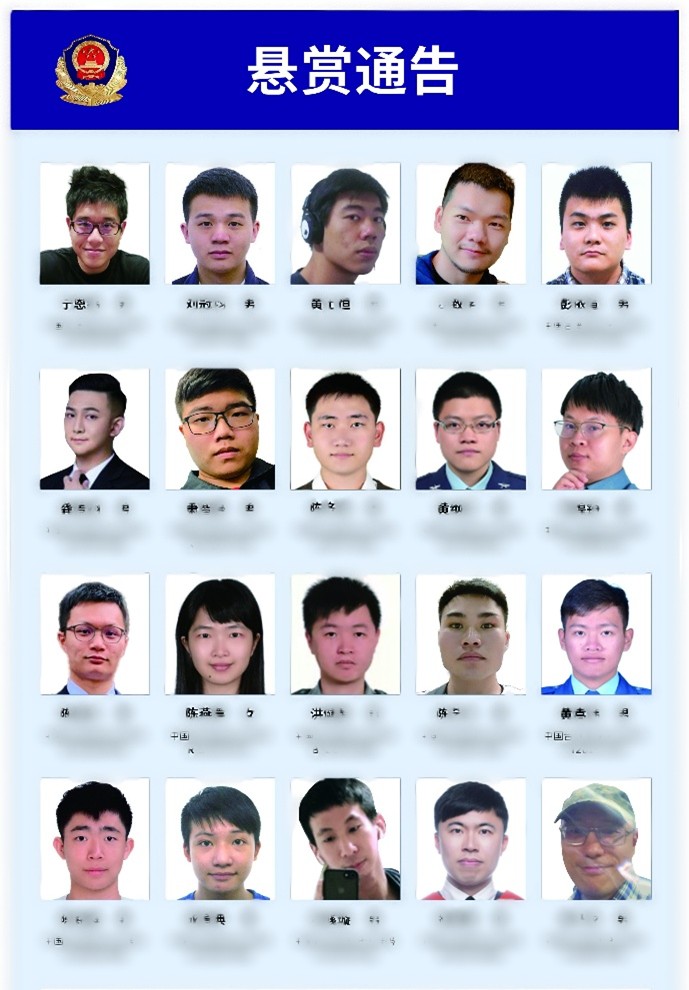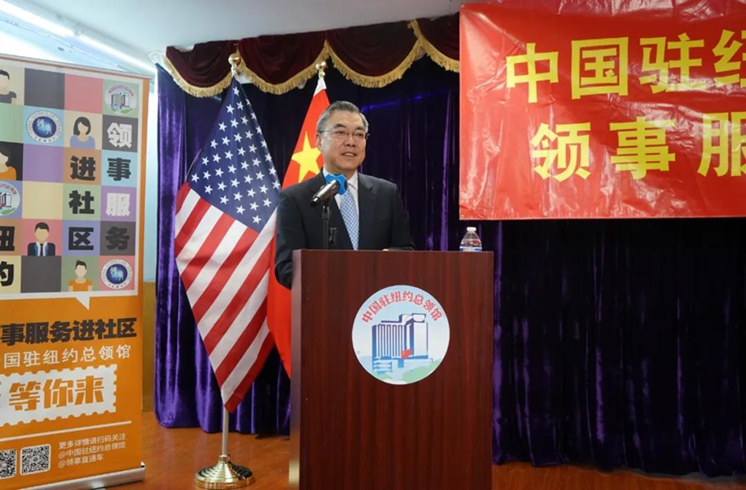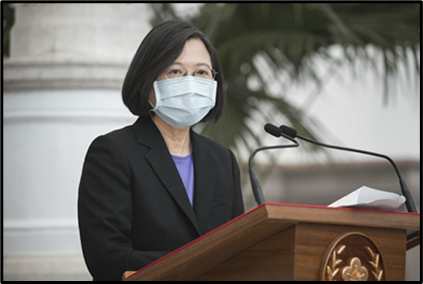
Taiwanese Public Opinion on China and Cross-Strait Relations: The Challenges for 2021
Taiwanese Public Opinion on China and Cross-Strait Relations: The Challenges for 2021
Introduction
Under the leadership of Chinese Communist Party (CCP) General Secretary Xi Jinping, the People’s Republic of China (PRC) has pursued increasingly aggressive tactics aimed at undermining the delicate status quo of cross-strait relations and pressuring the Republic of China (ROC, aka Taiwan) to agree to Beijing’s “One China” principle. In 2020, the Chinese air force made a record number of incursions into Taiwan’s air defense identification zone—breaking a record that dates back to 1996 (Taipei Times, January 4). Recently, the Biden administration publicly urged China to stop pressuring Taiwan after 13 Chinese aircraft flew into Taiwan’s ADIZ on January 23—a continuation of last year’s high-intensity activities that some analysts have described as a prolonged “psychological attack” aimed at wearing down the island nation (U.S. State Department, January 23; SCMP, October 3, 2020). In response, Taiwan increased its 2021 defense budget by 10 percent and has also engaged in more frequent military drilling and other preparations aimed at deterring a mainland attack (Nikkei Asia, August 13, 2020; SCMP, January 19).
Alongside these military pressures, local and international research groups have also documented a notable increase in the mainland’s “cognitive attacks” on Taiwanese society over the past year.[1] These encompass a variety of evolving tactics, including propaganda, hacking and misinformation, to influence public opinion (VOA News, January 17). As cross-strait relations chill, it is important to track how the Taiwanese public’s view of its government and the mainland has shifted, especially in the wake of the COVID-19 pandemic.
Despite a growing sense of independent Taiwanese identity and pro-independence sentiment across public society, President Tsai Ing-wen’s (蔡英文)administration has avoided explicit moves away from the ambiguously defined status quo, both to avoid worsening cross-strait relations and to avoid straining relations with the U.S., an important military ally that nonetheless does not officially recognize Taiwan as a sovereign state. Instead, Tsai’s administration has suggested that China’s handling of Hong Kong and its more aggressive military actions in the Taiwan Strait—and in the South China Sea more broadly—signal a shift away from the status quo.
This past May, Chinese Premier Li Keqiang (李克强) reportedly deviated from decades of rhetoric about (peaceful) reunification during his remarks at the annual Two Sessions, creating confusion about the continuing recognition of the so-called “1992 Consensus” that sets the basis for maintaining peace and stability in the Taiwan Strait and causing a flurry of concern from international observers (CGTN, May 22, 2020; The Diplomat, June 2, 2020). Similarly vague language from the October readout of the CCP Central Committee Fifth Plenum in October failed to clarify the issue (CSIS, October 30, 2020). Apart from this, Taiwan’s public success in handling the COVID-19 pandemic—despite its isolation from international organizations such as the WHO—has raised its international profile. Taiwan’s COVID-19 experience sharply contrasts with that of China, where efforts to cover-up early missteps have dramatically hurt its international reputation. China’s continuing lack of transparency and misinformation regarding the pandemic could also affect the Taiwanese public’s perceptions of the mainland.
With these issues in mind, the authors have analyzed individual-level survey data from National Chengchi University’s Taiwan’s Election and Democratization Study (TEDS) that was recently released, in an effort to further understand Taiwanese public perceptions of cross-strait issues. The study covers a sample of 1,214 Taiwanese respondents surveyed in September 2020 (National Chengchi University, December 22, 2020).
Taiwanese Views of China
The TEDS survey results show overall satisfaction with President Tsai’s handling of cross-strait relations. While the public is generally satisfied with Taiwan’s relations with China (55.25 percent satisfied or very satisfied), this varies widely between supporters of Tsai’s Democratic Progressive Party (DPP) (88.7 percent) and the pro-unification Kuomintang (KMT) (5.81 percent) (see figure below). Such rates are fairly consistent with partisan divisions during the first year of Tsai’s first term (Taiwan Sentinel, May 2, 2017; Taiwan Sentinel, January 23, 2018).
The results reflect a challenge for China. It appears that—apart from supporters of the KMT and other pro-unification parties—the Taiwanese public has not blamed the Tsai administration for the cooling of cross-strait relations, but instead tacitly accepted a more ambiguous relationship than what China demands under the 1992 Consensus and the “One China” principle. The approval may be due in part to Tsai’s adroit response in her first term to China’s apparent effort to unilaterally shift the foundation of the status quo.
In January 2019, Xi released a “Message to Compatriots in Taiwan,” which sought to remove all ambiguities about Taiwan’s reunification with China. In response, Tsai deftly tied the 1992 Consensus to China’s “One Country, Two Systems” framework governing the Hong Kong Special Administrative Region (China Daily, January 2, 2019; Office of the President, January 2, 2019). Tsai continued to disavow “One Country, Two Systems” following her reelection in May this year (Straits Times, May 20, 2020). The past year has seen the rapid erosion of political freedoms in Hong Kong following the passage of a new National Security Law, leaving most Taiwanese wary of the possibility of the extension of “One Country, Two Systems” to China-Taiwan relations.
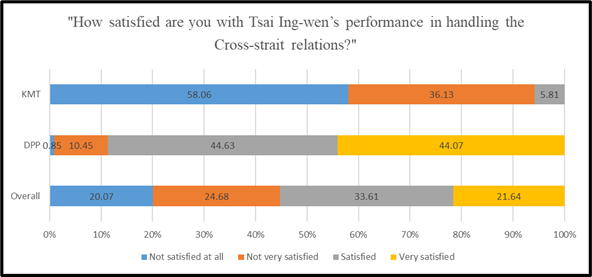
The TEDS survey also prompts respondents to rate how much they trust the Chinese government on a zero-to-ten scale. Here we find unsurprisingly little trust, with an average response of 2.04. As expected, DPP supporters were less trusting (1.13) and KMT supporters were marginally more trusting (3.52). Those who said they were “not satisfied at all” with Tsai’s handling of cross-strait relations on average scored trust in China at a relatively high 3.57, but that number drops to 0.74 for those who were “very satisfied” with Tsai’s current cross-strait policy. A similar pattern endures after controlling for demographic factors (age, education, gender) and partisanship. Trust in China is not only correlated with views of Tsai’s handling of cross-strait relations; there is a nearly identical pattern with responses on satisfaction with Tsai’s national defense policy and diplomacy. The broad lack of trust in a non-democratic China that frequently threatens Taiwan is unlikely to change as Beijing’s aggressions continue.
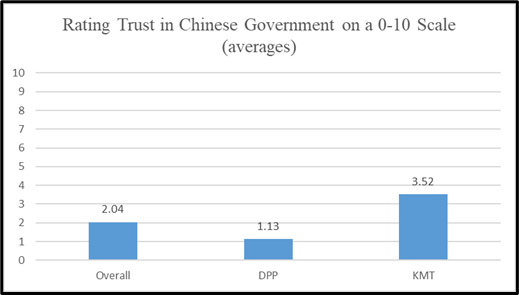
Impact of COVID-19 on Public Perception
Limited research links the COVID-19 pandemic to the exacerbation of cross-strait tensions.[2] As previously mentioned, global opinion of China declined last year—in part because of its initial COVID-19 response—while Taiwan has received largely positive acclaim for its pandemic response. One would expect this shift in global feeling to have at least an indirect impact on cross-strait relations. It has been argued that China viewed the U.S. and other countries’ poor responses to the pandemic as an opportunity to increase pressure on Taiwan with little risk of an American response. Some security analysts suggest that China’s actions against Taiwan amount to a kind of “gray-zone” warfare that aims to overpower Taiwan without ever escalating to actual war (Taiwan News, December 26, 2020; Asia Times, December 28, 2020). A senior Taiwanese security official characterized China’s post-COVID-19 posture as being a “clear shift” from the past, significantly elevating the risk of conflict on cross-strait issues (Reuters, December 10, 2020).
Meanwhile, a 2020 increase in Taiwanese nationalism corresponded with the island’s successful response to COVID-19. An early 2020 poll from the Taiwan Public Opinion Foundation found that approximately 83 percent of Taiwanese citizens considered themselves to be Taiwanese (as opposed to “Chinese” or “both Chinese and Taiwanese”). This marks the highest percentage seen since reporting began in 1991. A year before, 70 percent of those surveyed identified as Taiwanese even after Xi Jinping called for the “One Country, Two Systems” model in Taiwan and Beijing implemented a brutal crackdown on pro-democracy protestors in Hong Kong. The 13 percent year-on-year increase shows that the COVID-19 pandemic has led to a significant identity shift (Taiwan News, February 24, 2020). In another example of growing Taiwanese nationalism, 77.6 percent of Taiwanese surveyed in an October poll said that they would be willing to fight should China invade Taiwan (Taipei Times, October 25, 2020).
While the TEDS survey does not directly address Taiwanese views of China in relation to COVID-19, these sentiments can be extrapolated: as satisfaction with the Tsai administration’s handling of COVID increases, trust in China decreases. Individuals “least satisfied” with the Tsai administration ranked their trust in China at 4.55 on a scale from 0 to 10, while the “very satisfied” ranked trust in China at 1.47. Regression analysis controlling for age, gender, education and partisan identification finds a similar pattern, with trust in China declining by approximately two points between the least and most satisfied by the Tsai administration’s COVID policies (see image below).Views on the administration’s handling of COVID-19 also positively correlate with satisfaction on Tsai’s cross-strait policy. While the correlations may not endure long-term, they suggest that Beijing’s handling of issues beyond cross-strait relations also impacts Taiwanese perceptions of China. At the same time, Taiwan’s successful handling of COVID may have reinforced domestic perceptions of Taiwan’s quality of governance compared with China.
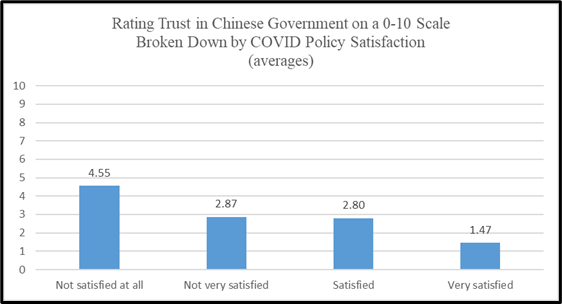
A Dim Future for Cross-Strait Unification
Survey results on preferences about Taiwan’s future status suggest unification’s limited appeal. Only 6.30 percent of respondents overall preferred eventual or immediate unification, compared to 36.83 percent in favor of independence. This is consistent with a growing trend towards the latter. Only 2.51 percent of DPP supporters and 22.15 percent of KMT supporters preferred unification. While the large figures in support of the continuation of the status quo may suggest that the Taiwanese are amenable to either outcome under ideal conditions, recent research contradicts the wishful thinking that the Taiwanese public could be amenable to unification. Previous analysis by the authors indicated that even under ideal conditions where the economic, social, and political conditions in China and Taiwan are the same, a plurality of KMT supporters (48.58 percent) would back unification, but only 29.35 percent of Taiwanese overall would do so. More glaringly, more Taiwanese overall would support independence even after attack (48.73 percent) than unification under ideal conditions (China Brief, October 19, 2020).
The findings here are consistent with similar surveys such as the Taiwan National Security Survey (TNSS) (The Diplomat, December 3, 2020). Taken as a whole, they suggest that while the Taiwanese have little interest in a military conflict with China or an abrupt shift from the status quo, an increasing number support independence, despite the risks associated with it. Chinese leaders’ threats to deter Taiwanese actions that would inch the island towards formal independence may lose their power going forward. As the PLA’s provocations around the Taiwan Strait increase and Chinese leaders appear to countenance the prospect of unpeaceful unification, the potential for conflict increases.
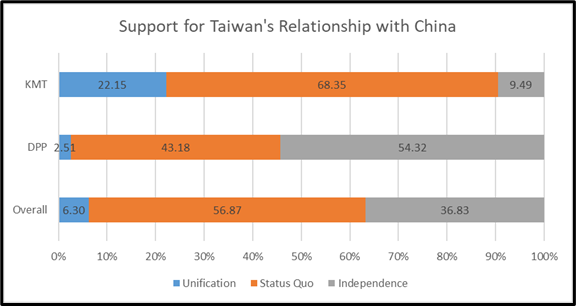
Conclusion
Overall, survey results from the last year follow a clear continuation of trends in Taiwanese public opinion that are not in China’s favor. The Taiwanese public largely favors current cross-strait policies, has little trust in China and has decreasing interest in unification. The Tsai administration’s successful handling of COVID-19 has increased support for the government while alienating support for the mainland. China also should not necessarily expect more favorable conditions if the DPP lose local elections in 2022 or the presidency in 2024. After all, Taiwanese identification increased under the last KMT president even if independence sentiment stayed relatively stable. Tsai has also outperformed the combined vote share of both the KMT and the pro-unification candidate James Soong in two successive elections (National Chengchi University, January 25). Taking advantage of their country’s relative strength amid the ongoing pandemic, Chinese officials are likely to continue acting aggressively to prevent what they perceive as creeping support for independence in the short term. But such efforts only seem to reinforce negative public sentiments on China, while promoting broader sympathy for Taiwan both at home and abroad.
Timothy S. Rich is an Associate Professor of Political Science at Western Kentucky University and Director of the International Public Opinion Lab (IPOL).
Madelynn Einhorn is an Honors undergraduate researcher at Western Kentucky University, majoring in Political Science and Economics.
Notes
[1] See: Nick Monaco, Melanie Smith, and Amy Studdart, “Detecting Digital Fingerprints: Tracing Chiense Disinformation in Taiwan,” a joint report from Graphika, the Institute for the Future’s Digital Intelligence Lab, and the International Republican Institute, August 25, 2020, https://www.iri.org/sites/default/files/detecting_digital_fingerprints_-_tracing_chinese_disinformation_in_taiwan_0.pdf; see also: Hong Zijie, Li Guancheng, “2020 CCP Political and Army Development Evaluation Report [2020中共政军发展:评估报告],” Institute for National Defense and Security Research [财团法人国防安全研究院], December 30, 2020, https://indsr.org.tw/Download/2020%E4%B8%AD%E5%85%B1%E5%B9%B4%E5%A0%B1%E4%B8%8A%E7%B6%B2%E7%89%88.pdf.
[2] See: Lucy Best and Yanzhong Huang, “Covid-19 Yields a Sharper Picture of China-Taiwan Relations,” Georgetown Journal of International Affairs, December 7, 2020, https://gjia.georgetown.edu/2020/12/07/covid-19-yields-a-sharper-picture-of-china-taiwan-relations/.
